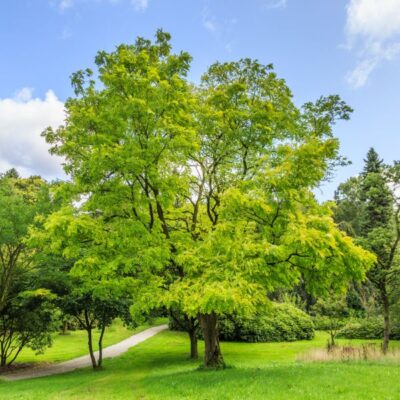Garden Plant: Black Locust
Product Description: Black Locust

Hardwood Black Locust Tree Has Fragrant Flowers
- Special Use Tree
- Grows Quickly
- Fragrant White Spring Flowers
- Erosion Control
- Rot Resistant Hardwood
- Fantastic Honey Tree
- Incredibly Hardy
Farmers, homesteaders and entrepreneurs, take note. This native hardwood has many valuable uses as a cash crop. Fragrant spring flowers and fast-growing shade are a big bonus!
Native to the Appalachian Mountains of North America, this deciduous tree grows quickly in a wide range of climates, and soils types. As a legume, it will fix nitrogen in the soil, which helps improve poor soils.
There aren’t many trees as tough as this one. Black Locust is so hardy that it will not only tolerate difficult conditions, but thrive in them.
It’s extremely adaptable to almost any soil type. It grows in either wet or dry soils. Try this tree for locations where other trees may have failed. It’s tolerant of urban pollution and is drought and cold hardy.
Each spring, the Black Locust produces incredibly fragrant, long, hanging white flowers that look like Wisteria, and smell like heaven. They’ll also attract honey bees and hummingbirds.
Handsome foliage quickly fills out to provide dappled shade for the summer months. You cangrow warm season turf up to the trunk.
The matte green, wide, rounded leaflets on a pinnately compound leaf turn a pretty yellow in fall. Because each leaflet is small, fall cleanup is a snap!
How to Use Black Locust as a Crop Tree
The Black Locust has many applications in the landscape including as a fast growing shade tree, border plantings and erosion control. The trees ability to satisfy these applications quickly makes it highly desirable.
It can also be grown as a cash crop.
Extremely hard wood is great for lumber and flooring planks. Rot-resistant, straight trunks make valuable poles. High-density, rot resistant wood is ideal material for decks, outdoor furniture and fence posts and other projects that require weatherproof materials.
Black Locust logs make excellent firewood. They split easily, burn hot and easily create an effective bed of coals. Grow a stand just for fuel, but be warned! You may go through several chains on your saw cutting these hard trees up. The results will be worth it.
And that’s not all!
The delicious honey sourced from Black Locust is commonly referred to as Acacia Honey. It’s very light in color and beautifully translucent. Delicate, fruity, floral fragrance and sweet taste add to the appeal. It’s a great honey for children over the age of 1 because of the high fructose levels. They’ll love that sweet, natural taste!
Why not set up a managed grove of Black Locusts to support beehives? People love buying local honey at Farmer’s Markets and online. Use the honey in skin care and other holistic products.
Pro Plant Tips for Care
For managed crops, consider rotating out the trees every 10 years. Coppice firewood trees to the ground.
Don’t plant a grove near corrals, barns or pastures frequented by cattle or horses. Do your research before you consider using as fodder or mast for deer hunting.
If used in a home landscape, it’s best used as a shade tree with lawn under it. Plan to mow regularly all around the tree. Regular mowing will help manage this vigorous tree.
We use an online database called Plant Sentry. We follow all federal, state and local restrictions for sale if this tree is this concern in your area. The purple-flowering hybrid selection of Robinia pseudoacacia \’Purple Robe’ is a recommended substitute for home gardens.
The Black Locust is a fast-growing, hardy tree with incredible ornamental features. Plant one today and begin enjoying its rare and unique features. Manage it carefully and enjoy the profits from this valuable native plant.


